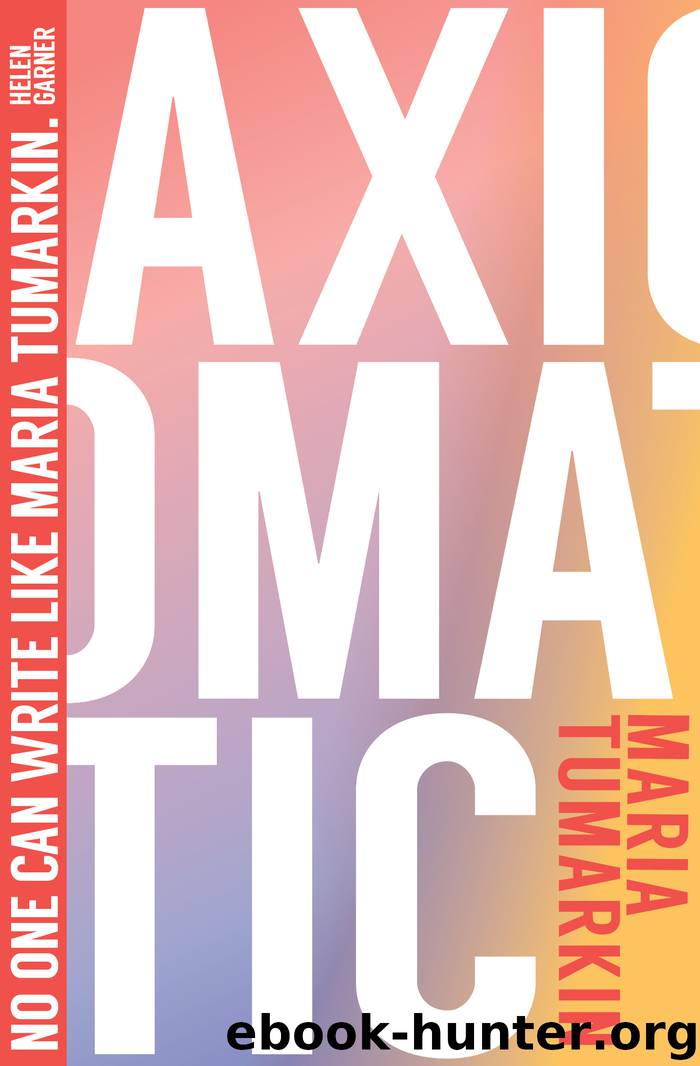Axiomatic by Maria Tumarkin

Author:Maria Tumarkin
Language: eng
Format: epub
Publisher: Transit Books
Published: 2018-09-02T16:00:00+00:00
PART TWO
I’ve heard Lorrie Moore say in a lecture she delivered at New York Public Library that parenting’s mostly useless: in the making of personhood the culprits are biochemistry and residential zipcode. Her lecture was entitled Watching Television, something Moore and her three siblings were more or less banned by their parents from doing on moral and religious grounds. Prohibition produced in them neither a great uniform hunger for TV’s pleasures nor uniform contempt for TV’s distractions. Instead came four zigzag reactions, four lives in which TV was not important or unimportant, which for Moore was more proof of parenting’s small role and the big role of other things, chiefly postcode, easily obscured in the 1.8-meets-2.2-kid families world. All that’s needed, Moore said, is a large enough sample and we will see most people become who they need to whatever their parents get up to.
I was thinking the opposite. Somehow something claims us. Certain prototypes assert themselves, usually later in life. And for those who took an oath a long time back to (I do not count myself in this group) under no circumstances become our parents this may feel like a form of possession, or like being possessed. You open your mouth and your mother’s voice comes out complete with your mother’s words. Stuck in a mirror’s that old inbuilt irony: your father’s eyes. It’s like Mikhail Bakhtin’s idea that every utterance in this world contains in some way all the utterances that preceded it. We contain our parents, doesn’t mean we are them, it means we go from being inside of them to them being inside us.
Hungarian writer Péter Esterházy wrote an 850-page novel at the beginning of our century—the 21st, which did you think?—called Celestial Harmonies. That’s the English translation, the book was in part a tribute to his father who was a count by birth, member of a prominent Austro-Hungarian clan, a man stripped of everything by the new communist government at WWII’s end and forcefully relocated to the countryside. He stayed an aristocrat in spirit, and in his admiring son’s eyes. (‘My father never looked down on anyone, which is how he was an aristocrat. My grandfather looked down on everyone, which is how he was an aristocrat. As for me, I just keep blinking.’)
Celestial Harmonies was divided in two. In Book One paternal ancestors spanning centuries were referred to as ‘my father’; in Book Two ‘my father’ was his actual biological father, Mátyás. The idea of Book One’s ‘my father’ including all the fathers of all the family’s sons—a conceit aided by the Esterházy clan’s fame but just as apt, I feel, for us dynastic pipsqueaks of no spectacular lineage—collided with the recent history of communist dictatorships sabotaging familial bonds. Lenin, Stalin, plus other minor Soviet bloc dictators whose inner workings I know less about, were heralded as their people’s true fathers (‘oh lord, You are our Father, we are the clay and You our potter’—that was the verbatim thrust of it, or verbatimish, in our godless lands).
Download
This site does not store any files on its server. We only index and link to content provided by other sites. Please contact the content providers to delete copyright contents if any and email us, we'll remove relevant links or contents immediately.
| Ancient & Classical | Arthurian Romance |
| Beat Generation | Feminist |
| Gothic & Romantic | LGBT |
| Medieval | Modern |
| Modernism | Postmodernism |
| Renaissance | Shakespeare |
| Surrealism | Victorian |
4 3 2 1: A Novel by Paul Auster(12391)
The handmaid's tale by Margaret Atwood(7763)
Giovanni's Room by James Baldwin(7346)
Asking the Right Questions: A Guide to Critical Thinking by M. Neil Browne & Stuart M. Keeley(5775)
Big Magic: Creative Living Beyond Fear by Elizabeth Gilbert(5771)
Ego Is the Enemy by Ryan Holiday(5447)
The Body: A Guide for Occupants by Bill Bryson(5096)
On Writing A Memoir of the Craft by Stephen King(4943)
Ken Follett - World without end by Ken Follett(4731)
Adulting by Kelly Williams Brown(4574)
Bluets by Maggie Nelson(4556)
Eat That Frog! by Brian Tracy(4540)
Guilty Pleasures by Laurell K Hamilton(4448)
The Poetry of Pablo Neruda by Pablo Neruda(4106)
Alive: The Story of the Andes Survivors by Piers Paul Read(4031)
White Noise - A Novel by Don DeLillo(4009)
Fingerprints of the Gods by Graham Hancock(4004)
The Book of Joy by Dalai Lama(3986)
The Bookshop by Penelope Fitzgerald(3852)
